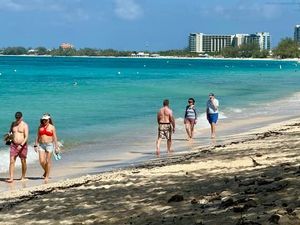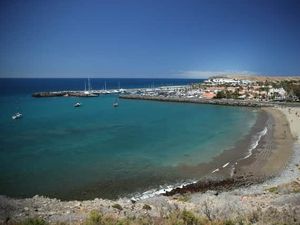Five urgent travel warnings issued after Tenerife tourist 'selfie' death, gang shootings and Canary Island warships
Tenerife holiday warning: Officials warn holidaymakers to not risk their lives after tourist, 53, dies after swept out to sea while taking selfie

A 53-year-old tourist died in Puerto de la Cruz in Tenerife after he was swept out to sea while trying to take a selfie
A 53-year-old tourist died in Tenerife on Wednesday while taking a selfie. Tenerife officials have issued a warning to tourists to not to risk their lives for the ‘perfect’ holiday photo after the tourist died falling into the sea while he was trying to take a selfie.
Yesterday the Canary Islands was under an orange weather warning for strong waves and gusts of more than 90 kilometres per hour when the man was taking holiday photos. The man was swept out into the rough seas near the natural pools in Puerto de la Cruz, Tenerife. Officials at the Emergency and Services Coordination Centre (CECOES) were alerted to the fall at around 4.15pm yesterday.
A huge rescue operation was quickly launched which included a helicopter, ambulances, SUC medical personnel, as well as Maritime Rescue boats and agents from the Local Police, National Police, Guardia Civil, and the Fire Brigade. The Czech national was rescued by a helicopter which dragged him out of the sea.
Canary Islands emergency services shared a dramatic video showing the moment an emergency team official risked their life by descending from the helicopter and hoisting the man out of the water in the middle of a strong swell. However, paramedics found that the man was already in cardiac arrest with signs of drowning. The emergency crew on the helicopter performed valiant CPR during the flight to a hospital to try to save his life.
Spain holiday warning: Travel warning as police launch 'Operation Marbella' after gang shootings brand hotspots including Puerto Banus the 'Wild West'
UK holidaymakers issued Spain travel warning as police launch ‘Operation Marbella’ to crackdown on gang shootings in holiday hotspots such as Puerto Banus
UK holidaymakers have been issued with a Spain travel warning as police in the country launch “Operation Marbella” to crackdown on violence after recent gang shootings. The popular holiday destination in Spain, Costa del Sol, is increasingly becoming a hotspot for crime.
There were two terrifying shootings in March within the space of a week. One incident unfolded at a famous British-owned restaurant in the area, La Sala and no one was injured. The likes of Tyson Fury, Anthony Joshua, Erling Harland, Jurgen Klopp and Harry Maguire have all visited the restaurant.
In the other incident just days prior a young man was seriously injured in a shoot-out in Puerto Banus. Yesterday (Thursday 11 April) it was reported that the victim of the shooting in Nueva Andalucia, a residential estate a five-minute drive from Puerto Banus, had been British. The 21-year-old was rushed to hospital with gunshot wounds to his knee and "pelvis area".
Police have warned locals and visitors they can expect to see more random stops and officer checkpoints in and the holiday destinations. They are understood to be increasing vigilance in residential areas as well as shopping centres and nightspots, including in Puerto Banus, known for attracting millionaires.
Canary Islands holiday warning: UK tourists issued travel warning as Morocco sends 'warships'
A Canary Island travel warning has been issued due to Moroccos’ military activities with warships sending a two-word warning.
The Canary Islands are bracing for potential disruptions to their peace and tourism due to Morocco's military offensive.
In March 2023, Spanish Foreign Minister Jose Manuel Albares remarked on the strengthened ties between Morocco and Spain, citing a new pinnacle in their relationship.
In a recent speech to the Spanish Senate, Albares stressed the importance of maintaining Spain’s relationship with Morocco as a top priority in its foreign and state policies.
The manoeuvres come in the context of escalating regional tensions and increasing interest in maritime security, especially in areas of strategic importance such as the Strait of Gibraltar and the Canary Islands.
Lanzarote, Tenerife and other island holidaymakers have been warned over the military activities.
The president of the Cabildo of Gran Canaria, Antonio Morales, has voiced staunch opposition to Morocco's planned military manoeuvres off the coast of Western Sahara.
He said: "The area of northwest Africa and the Canary Islands in particular need actions of peace and to flee from any message of militarisation”.
Yellow fever vaccine: Holidaymakers issued travel warning as fatal disease surges - symptoms and how to reduce risk
UK holidaymakers are being warned of a potentially fatal disease that is hitting some popular tourist hotspots.
Travel Health Pro, an official government advice site used by the Foreign Office, has highlighted the rise of yellow fever, a disease that became well known in the 18th century when it was frequently called ‘Yellow Jack’.
It caused huge fatalities among soldiers and sailors serving overseas, especially in the tropics. It is spread by mosquitos and can cause a serious haemorrhagic illness which can be fatal for humans.
Tourists heading to the Caribbean, parts of Africa, Central and South America are being warned to be vigilant. Countries which have experienced recent outbreaks include Trinidad in the Caribbean, Burkina Faso, Cameroon, Central African Republic, Chad, Republic of the Congo, Côte d’Ivoire, Democratic Republic of the Congo, Guinea, Niger, Nigeria, South Sudan, Togo and Uganda.
Seven confirmed yellow fever cases included four fatalities in South America which were reported between January 1 and March 19 this year. There have also been three fatal cases in Colombia, two cases in Guyana and two cases in Peru - which included one death. Brazil has reported confirmed yellow fever in monkeys indicating it is circulating in the country.
Foreign Office travel advice: Eight countries added to 'do not travel' warning list for UK holidaymakers after declared 'too dangerous'
The Foreign Office has added eight countries to its “do not travel” warning list.
The government urges UK holidaymakers not to travel to the eight new countries added to the list as they have been declared “too dangerous”.

The Foreign Commonwealth and Development Office (FCDO) issues advice to holidaymakers and regularly updates its travel advisories based on how dangerous countries are perceived to be and what particularly to look out for when visiting them. In total, 66 countries - or parts of countries - have been declared "too dangerous" for British tourists by the FCDO.
Eight nations have been added to the list by FCDO, these are Russia, Ukraine, Iran, Sudan, Lebanon, Israel, Belarus and the Palestinian territories.
These nations are categorised as either on the 'red list' or 'black list' by experts in the UK Foreign Office.
The FCDO does not ban UK citizens from travelling to these countries but it says they may find themselves without any government support if something were to go wrong.
The advice given for each country is slightly different but the same warning is given that help may not be offered to those who travel.
The Belarus warning from the FCDO reads: "Russian military operations are taking place in Belarus.
"There is some risk that direct conflict linked to the war in Ukraine may spread to Belarus. If conflict starts, FCDO’s ability to offer consular assistance will be severely limited. Routes out of the country are limited, particularly by air."
Currently the Foreign Office is sternly advising against travel, or all but essential travel, to 24 destinations on the 'black list'.
These destinations are: Afghanistan, Belarus, Burkina Faso, Central African Republic, Chad, Haiti, Iran, Iraq, Israel, Lebanon, Libya, Mali, Niger, North Korea, Palestinian territories, Russia, Somalia, Somaliland, South Sudan, Sudan, Syria, Ukraine, Venezuela, and Yemen.





